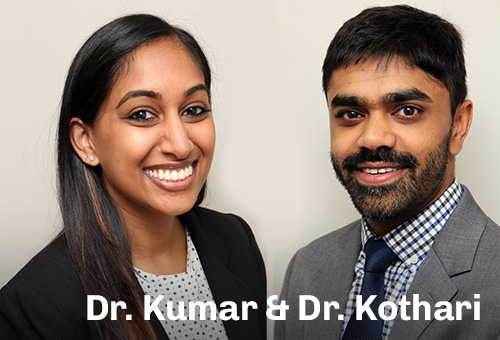
Should I stop my baby from sucking their thumb? Will using a pacifier ruin my child’s teeth? As a Tarrytown pediatric dentist and orthodontist, Dr. Kumar and Dr. Kothari get a lot of questions from parents about thumb sucking and pacifiers. It’s not surprising considering there’s quite a bit of misinformation floating around.
First, let us reassure you, thumb sucking in babies is absolutely normal and pacifiers have actually been tied to a lower risk of SIDs, so there’s no need to worry. Of course, when the habit continues beyond the toddler years, there are concerns, which we’ll get to, but, most of the time, little ones are just embracing a natural instinct. To help give you a better idea, here’s our guide to pacifiers, thumb sucking and teeth.
What Age is Thumb Sucking and Pacifier Use Considered Normal?
Babies are born with a natural sucking reflex and the act of sucking on their thumbs and fingers is comforting to them. In fact, many babies suck their thumbs in the womb! It makes them feel secure and helps them learn about their brand new world. It’s also a way some children soothe themselves to sleep.
The majority of kids will stop thumb sucking or using a pacifier on their own between the ages of two and four. Even those that go on a little longer often face peer pressure to stop once they go to school. We usually tell parents to chat with us if their little one is still sucking their thumb or using a pacifier at age three and efforts to get them to stop on your own haven’t worked. If your kiddo is a really intense thumb sucker (i.e., you hear a popping noise when they take their thumb out of their mouth) and you notice changes in their baby teeth, you may want to reach out to a pediatric dentist like Dr. Kumar earlier.
How do Pacifiers and Thumb Sucking Affect Teeth?
We tend to worry more about thumb sucking and teeth when it’s intense or vigorous like we mentioned or very prolonged. Intense thumb sucking puts pressure on the teeth and palate and can eventually lead to orthodontic problems. As for pacifiers and teeth, when kids use pacifiers for a long time, it can lead to similar issues. Both habits can cause changes in the palate, misaligned jaws and teeth and issues like an open bite, overbite or front teeth that stick out. Problems are more likely when kids continue a thumb sucking habit once the permanent teeth start to erupt.
How to Stop Thumb Sucking and Pacifier Habits
- To help a child stop using a pacifier, you can talk with them and let them know the pacifier will be going away and then take it away. Or, many kids benefit from a phased approach where you take the pacifier away during the day when they’re happy and just use it for naps and bedtime. Then, eventually you’ll just offer it bedtime before getting rid of it completely.
- Since you can’t take your child’s thumb away, stopping thumb sucking can be a little trickier than quitting the pacifier. Again, talk with your child about why they need to stop and brainstorm ways to end the habit together.
- Praise your child for not sucking their thumb or using a pacifier. You can also opt for other types of positive reinforcement like letting them choose a movie to watch or a fun activity to do if they go a predetermined amount of time without engaging in the habit.
- Anxiety is often a reason for thumb sucking in toddlers and children. Get to the bottom of what’s causing their anxiety and then try to work on learning different ways to cope.
- Scolding or yelling at a child have been proven ineffective in getting them to stop thumb sucking or using a pacifier. Instead, try gentle reminders since it can be a subconscious habit.
- Talk with your pediatric dentist. Dr. Kumar can chat with your child about why they should stop the habit and go over how thumb sucking affects teeth. She can also offer advice on what you can do as a parent to help your child.
- If nothing else works and your child’s thumb sucking is interfering with their oral development, habit-breaking appliances can be an option. These appliances simply block the thumb from coming into contact with the back of the front teeth, which makes it less pleasurable. The appliances are painless, safe and can be really effective.
If you have questions about pacifiers or thumb sucking and teeth, don’t hesitate to reach out to Dr. Reshma Kumar at 914 Smiles! Both Dr. Kumar and Dr. Kothari are experts in kids’ dental development. We can keep an eye on your child’s growing smile and help you manage oral habits, including thumb sucking and pacifiers.



